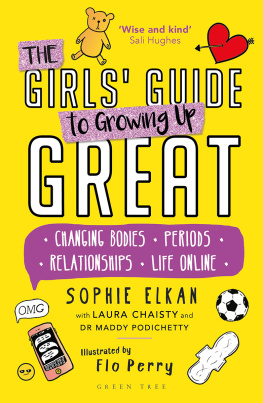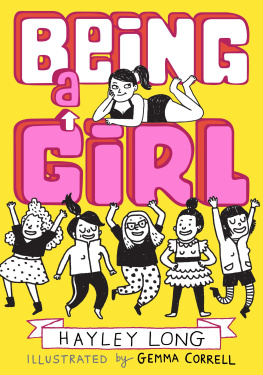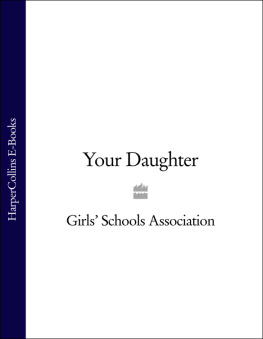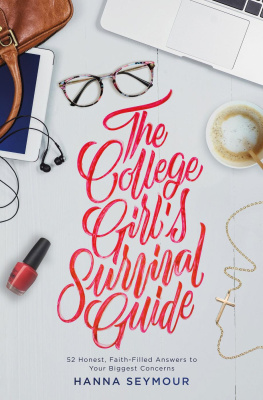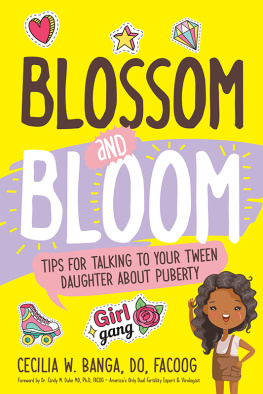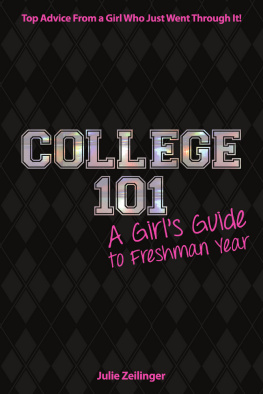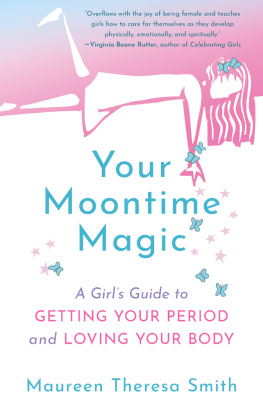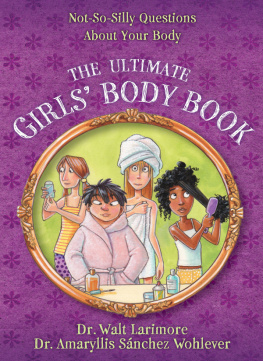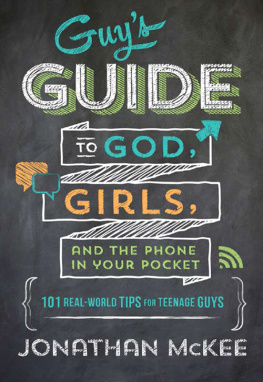Everything You Ever
Wanted to Ask About
Periods
Fiona Finlay is a consultant community paediatrician in Bath. Her professional interests include research into paediatrics, child protection and adolescent medicine. She is a parent of school-age children.
Rosemary Jones is a consultant community paediatrician in Bath. Her professional interests include child protection, adolescent medicine and children who are fostered and adopted. She is a parent of children now in their teens and twenties.
Tricia Kreitman worked as a psychologist designing sex education programmes for young people and then as a psychosexual therapist before becoming a full-time author and broadcaster. She was an agony aunt for more than twenty years working on a range of teenage and womens magazines and websites. Tricia is a parent and has worked closely with the fpa (Family Planning Association) and Brook the young peoples sexual health advisory service. She has written seven books for young people.
Everything You Ever
Wanted to Ask About
Periods
Tricia Kreitman, Fiona Finlay & Rosemary Jones
Piccadilly Press London
To all our families
First published in Great Britain in 2001 by Piccadilly Press Ltd, 5 Castle Road, London NW1 8PR
www.piccadillypress.co.uk
This edition published 2010
Text copyright Tricia Kreitman, Fiona Finlay & Rosemary Jones, 2001, 2010
Illustrations Sara Walker, 2001
All rights reserved. No part of this publication may be reproduced, stored in a retrieval system, or transmitted in any form or by any means electronic, mechanical, photocopying, recording or otherwise, without the prior permission of the copyright owner.
The right of Tricia Kreitman, Fiona Finlay & Rosemary Jones to be identified as Authors of this work has been asserted by them in accordance with the Copyright, Designs and Patents Act 1988
A catalogue record for this book is available from
the British Library
ISBN: 978 1 84812 060 0 (paperback)
eBook ISBN: 978 1 84812 171 3
1 3 5 7 9 10 8 6 4 2
Printed in the UK by CPI Bookmarque, Croydon, CT0 4TD
Cover design by Simon Davis
Cover illustration by Sue Hellard

Acknowledgements
We would like to thank all the girls who helped us with this book by writing to us, talking to us, confiding their problems, answering our questions and telling us what they really wanted to know.
We are particularly grateful to Emily, Alice and Polly Jones for all their advice.
And we give very special thanks to Marilyn Malin, for all her support and encouragement, as well as Brenda Gardner and her fantastic team at Piccadilly.
How to Use This Book
Everything in this book is based on what real girls have said they really want to know.
You may choose to read straight through from the beginning to the end, or just pick out the sections that sound most interesting to you.
Apart from Chapter 1, each chapter begins with a list of the topics covered in that section.
Most chapters also have true-life stories and problem pages.
Finally, because its so hard to talk about your bodies and whats happening inside you without using some medical or technical names, weve made a list (glossary) with all the words you might not know. These words usually show up in italics and you can look them up in the glossary at the back of the book where it explains what they mean.
Introduction
In 20 years as an agony aunt, Ive probably received about 300,000 letters, emails and texts (yes, the letters on problem pages really are genuine) from girls aged 10-17. Amongst the problems with boyfriends, worries about weight and complaints about over-protective parents, there was a constant stream of questions about periods.
The questions that girls ask include:
How will I know when Im about to start my periods?
Exactly how much blood do you lose?
If you carry on bleeding for several days, how come you dont bleed to death?
If you wear a tampon, what happens when you go to the loo?
Does blood leak out when you are in a bath or swimming?
What do you do if it starts and you havent got anything with you?
Will other people be able to tell that youre having your period?
Will it really, really hurt?
Reading all these questions made me realise just how many girls were still worried and confused about something that happens and has always happened to all women. Three things were particularly clear:
Lessons in school about periods and growing up often tell girls too little, too late.
Many parents find it difficult or even impossible to talk about periods and body changes.
The information that parents or schools do give is often biological rather than practical. As one girl put it: They just showed us diagrams and talked about hormones.
What we really wanted to know was what to do if your period suddenly started when you werent expecting it.
A while back, I was lucky enough to meet two consultant paediatricians (doctors specialising in children and young peoples medicine),Fiona Finlay and Rosemary Jones. They were working with young people in schools and clinics and had been hearing the same questions that I had. They shared my concerns and together we started to look more closely at the problem.
We researched what happens and when to girls as they grow up. We have published results and spoken at conferences for many professionals working in health and education,but our main aim was to help the girls themselves. We wanted to get rid of the misunderstandings, confusion and worries surrounding periods so we decided to write this book.
We didnt write it for professionals or parents although they may be interested to see whats in it! This book was especially written for girls who are about to start or have already started their periods. Hopefully, this will give them the answers to some of their worries, or at least the confidence to ask for more help and advice if they need it. Everything we have written is in direct response to what young people have asked us or told us they wished they had known, and every section has lots of quotes from girls talking about their own experiences.
T RICIA K REITMAN
C HAPTER 1
Why Do I Need to Know All This?
Periods are a natural part of growing up and becoming a woman, so you might wonder what all the fuss is about! We wrote this book because so many girls had asked us for advice and information about periods. You might also find it useful for the following reasons:
Because even if your periods havent started yet, one day they will. You can then probably expect to have one every month for about 40 years. The average period lasts for about five days each month, so if you added all those days together you could calculate that about six and a half years of your life will be spent having periods! It makes sense to find out as much as possible about periods so youre really well prepared.
Because many people (parents included) find it difficult to talk openly about periods. Advertisements for pads and tampons add to this embarrassment by never mentioning the word blood. They also give the impression that it would be the most embarrassing thing in the world if someone discovered you were having your period. So its not surprising that lots of women go to great lengths to hide the fact that theyre having them, even from their own families. Unfortunately this becomes a vicious circle and a girl can easily pick up this feeling of embarrassment from her mum, making it hard for her to ask questions and just as difficult to talk to her own daughter about periods when the time comes.
Next page

